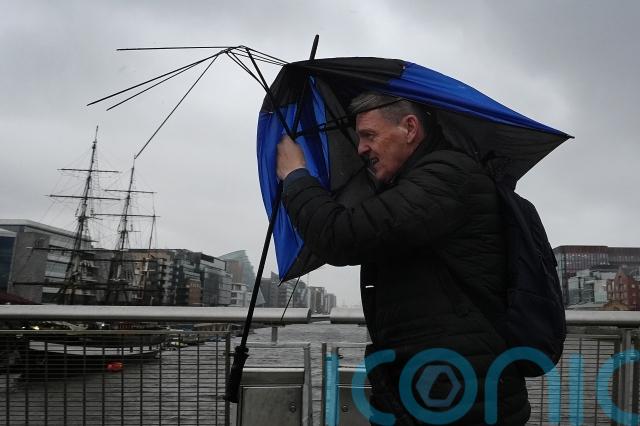
Communities were warned that further flooding was possible over the weekend after Storm Claudia brought high winds and heavy rain.
Thousands of homes and businesses were left without power as rain weather warnings lifted in the south-east on Saturday morning.
Dramatic flooding was reported in Portarlington, on the border of counties Laois and Offaly, despite no rain warning being issued for those counties, as well as in Co Wexford.
While there'll be an improvement in weather conditions today, the impacts of recent heavy rainfall☔️ will continue in parts over the weekend, with further flooding possible in Leinster and Munster🌊.https://t.co/sFyGizBDqq
— Met Éireann (@MetEireann) November 15, 2025
Fallen trees blocked roads in parts of the country and social media videos appear to show sea foam being dramatically whipped onto shore at Loughshinny, Dublin and Bray, Co Wicklow.
The National Directorate for Fire & Emergency Management (NDFEM) convened a meeting of all local authorities, relevant government departments, state agencies and utility providers on Saturday afternoon to discuss the response to the storm.
It said the impacts of heavy rain will continue in parts over the weekend, with further flooding possible in Leinster and Munster as some rivers had not yet peaked.
As there had been rainfall in previous days, many grounds are “already saturated”, it said, adding that many rivers were “at capacity”.
The Department of Social Protection has activated the relevant flood relief humanitarian assistance scheme for households affected by the weather event, and the Department of Enterprise is liaising with local authorities about the activation of the scheme to help businesses.
Keith Leonard, national director of the NDFEM, said people should be aware of the conditions in their area.
“River and surface water flooding has occurred in some areas in Leinster and Munster today, due to the rainfall yesterday and earlier this week, which has led to saturated grounds and swollen rivers, some of which have broken their banks.
“We are asking people to drive with extreme caution and be aware of the local conditions which will vary from place to place depending on the level of flooding.
“We continue to ask people to avoid open riverbanks and canal paths in flood conditions, and to stay away from swollen rivers, streams and flooded riverbanks, where banks can collapse without warning.
“Flooding impacts can be very localised and specific, so be sure to heed any advice issued by the emergency services and your local authority.
“Drivers also need to be aware of potentially hazardous conditions in their local area, so please slow down, increase stopping distances and watch for surface water and debris on roads.
“If the road ahead is flooded, do not enter – turn around and find another route.”

As of Saturday evening, a few hundred homes, farms and businesses remained without power as crews continued to respond to outages.
A spokesman said the storm brought a “modest impact” to electricity infrastructure in line with previous wind warnings.
A status orange rain warning was in place for counties Dublin, Wexford and Wicklow until 8am on Saturday, while a status yellow rain warning was in place in 10 other counties, mostly along the east and south coasts, until 9am.
In Northern Ireland, a yellow-level rain warning is in place in counties Armagh and Down until noon on Saturday, bringing a risk of flooding and hazardous travelling conditions.
Speaking on Co Kildare, Irish deputy premier Simon Harris said that he was grateful to those trying to reconnect people on Saturday morning.
He said there were “far too many” communities where funding was announced for flood defence but the timeline for their delivery was “still taking too long”.
“I think it’s a cause of huge frustration to communities that are on a list for a flood defence scheme the length of time it takes from being put on that list to the delivery.”
He was speaking at the Fine Gael Agriculture and Rural Affairs Development Conference.
“On one level, we (are) obviously living through a period of significant climate change, more adverse weather events, and there’s a huge amount of evidence to suggest that that is likely to be an ongoing scenario.
“Having said that, we can’t kind of be defeatist or fatalistic in relation to this, there are more things we can and should be doing ourselves as a country to make our communities and our towns more resilient.”
He said that the delivery of flood defence schemes should be part of the infrastructure boost the Government is promising to deliver, and said that the infrastructure of gullies and drains and how they can become blocked should also be examined.
Subscribe or register today to discover more from DonegalLive.ie
Buy the e-paper of the Donegal Democrat, Donegal People's Press, Donegal Post and Inish Times here for instant access to Donegal's premier news titles.
Keep up with the latest news from Donegal with our daily newsletter featuring the most important stories of the day delivered to your inbox every evening at 5pm.